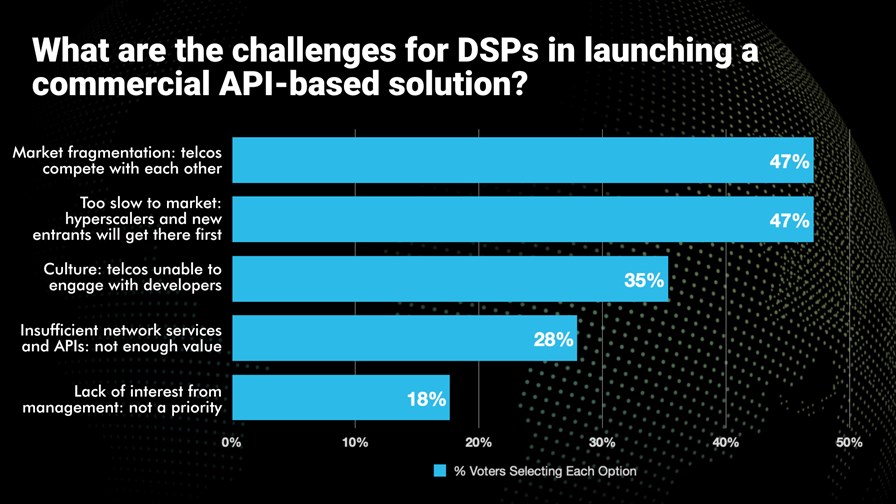
- Telcos are now well placed to develop network APIs that can be used by developers and drive new business opportunities
- But while the technology enablers might now be available, there are still some familiar hurdles to overcome
- Working in tandem and getting to market in a timely fashion appear to be the main hurdles to overcome, according to our poll results
After years of false starts, the digital service provider (DSP) technology and strategy stars have aligned and the era of network API services, along with new business models for progressive telcos, is upon us, Juan Carlos Garcia Lopez, SVP of technology innovation and ecosystem at Telefónica, told the audience at the recent DSP Leaders World Forum 2023, which was held in-person in Windsor, UK, and streamed live.
That much may be true, but that doesn’t mean there aren’t still some very familiar hurdles for those progressive DSPs to overcome if they are to fulfil their API ambitions, according to the results of a poll conducted during the forum’s third session, Why data and APIs are key to implementing the vision of the digital services provider.
The session was co-hosted by Garcia, and it gave rise to very lively debate, not only involving speakers on the stage but also audience members, regarding the potential (or lack of) offered by network API development. Not everyone is as bullish as Garcia, though it’s worth noting too that more than two dozen major operators have already put themselves forward to collaborate on network API development via the GSMA’s Open Gateway initiative, with Telecom Argentina joining the throng just this week.
But despite encouraging signs, there are barriers to success.
The poll asked: What are the challenges for DSPs in launching a commercial API-based solution?
Respondents were able to select all options they deemed relevant.
As the chart above shows, two options proved equally popular with respondents.
‘Market fragmentation: Telcos go it alone and compete with each other’ attracted votes from 47% of respondents, who are clearly still scarred from the many times the industry has pledged to work in unison and then splintered as companies seek competitive advantage over their peers.
And it’s not just our voters who believe fragmentation, across the entire ecosystem, is a major issue – see CSPs need to tackle fragmentation to unlock potential of network APIs – research.
Attracting the same level of support was the option ‘Too slow to market: Hyperscalers and new entrants will get there first’. That will be a very familiar tale to anyone who has worked in telecom in the past 15 years, during which the cloud and big tech giants have dominated the digital services world and built massive businesses with enormous valuations, while the telcos (mostly) wither on the financial vine.
It’s interesting that only 35% of respondents identified ‘Culture: Telcos are unable to engage with the developer community’ as a challenge for the progressive DSPs, as the topic of cultural evolution within the network operator community, and the long-problematic inability to appear as attractive partners to application developers, are often discussed when the digital service provider topic crops up in industry conversation.
Only 28% of respondents thought ‘Insufficient network services and APIs: Not enough compelling value’ would be a challenge, which is perhaps reflective of the fact that a number of universal network APIs have already been developed by the telco community, including APIs that could play a key role in Industry 4.0 scenarios, private networks and edge service delivery.
Even fewer respondents, just 18%, cited ‘Lack of interest from management: It is not seen as a priority’ as a challenge, perhaps because the initial joint industry effort is already underway.
Garcia noted in his address that new network APIs are in the pipeline and that the second half of this year will see further positive steps for the DSP community – if he’s right, some of these challenges may yet be overcome, even if history suggests that might be a bit of a long shot.
- Ray Le Maistre, Editorial Director, TelecomTV




